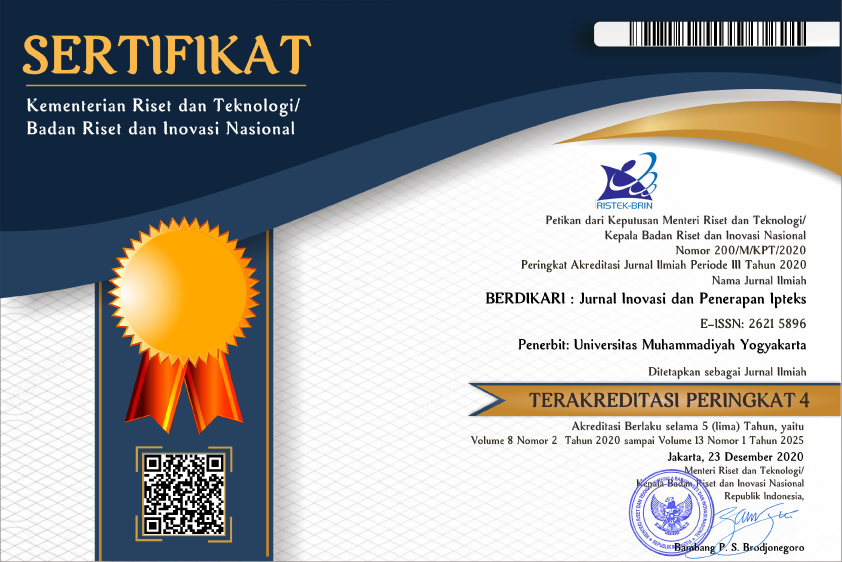Dampak Pemanfaatan Biogas pada Rumah Tangga Petani di Kabupaten Boyolali
DOI:
https://doi.org/10.18196/bdr.7153Keywords:
Biogas, Impact Evaluation, Environment, Renewable EnergyAbstract
This study aims to measure the impacts of biogas utilization in farmer’s household scale in Boyolali Regency. The survey toward 67 respondents of famer’s households in Samiran Village, Selo Subdistrict and Sruni Village, Musuk Subdistrict in Boyolali Regency were involved purposively. The farmer’s household involved in this study were the owners of biogas in household scale. For respondents having no biogas, it was required that they had known biogas in household scale. The data were analyzed using the impact evaluation model with Propensity Score Matching approach. The Treatment Effect Analysis shows that the biogas utilization in farmer’s household scale has significant impact on the decrease of Liquid Petroleum Gas (LPG) usage reaching until 2.54 kg/ month. Nevertheless, the impact on the firewood and organic fertilizer usage is insignificant. Through this study, it can be concluded that the utilization of household biogas among farmers has a significant impact on of the Liquid Petroleum Gas (LPG) usage.References
Abubaker, J., Risberg, K., Pell, M., 2012. Biogas
residues as fertilisers – Effects on wheat growth and
soil microbial activities. Appl. Energi 99, 126–134.
https://doi.org/http://dx.doi.org/10.1016/
j.apenergi.2012.04.050
Martí-Herrero, J., Ceron, M., Garcia, R., Pracejus, L.,
Alvarez, R., Cipriano, X., 2015. The influence of
users’ behavior on biogas production from low cost
tubular digesters: A technical and socio-cultural field
analysis. Energi Sustain. Dev. 27, 73–83. https://
doi.org/http://dx.doi.org/10.1016/
j.esd.2015.05.003
Mwirigi, J., Balana, B.B., Mugisha, J., Walekhwa, P.,
Melamu, R., Nakami, S., Makenzi, P., 2014. Socioeconomic hurdles to widespread adoption of smallscale biogas digesters in Sub-Saharan Africa: A
review. Biomass and Bioenergi 70, 17–25. https://
doi.org/DOI 10.1016/j.biombioe.2014.02.018
Putra, R.A.R.S., Liu, Z., Lund, M., 2017. The impact of biogas technology adoption for farm households
– Empirical evidence from mixed crop and
livestock farming systems in Indonesia. Renew.
Sustain. Energi Rev. 74. https://doi.org/10.1016/
j.rser.2016.11.164
Rosyidi, S.A.P., Bole-Rentel, T., Lesmana, S.B.,
Ikhsan, J., 2014. Lessons Learnt from the Energi
Needs Assessment Carried out for the Biogas
Program for Rural Development in Yogyakarta,
Indonesia. Procedia Environ. Sci. 20, 20–29.
https://doi.org/http://dx.doi.org/10.1016/
j.proenv.2014.03.005
Tigabu, A.D., Berkhout, F., van Beukering, P., 2015.
Technology innovation systems and technology
diffusion: Adoption of bio-digestion in an
emerging innovation system in Rwanda. Technol.
Forecast. Soc. Change 90, Part A, 318–330.
https://doi.org/http://dx.doi.org/10.1016/
j.techfore.2013.10.011
Downloads
Published
Issue
Section
License
Copyright
Authors retain copyright and grant BERDIKARI Jurnal Inovasi dan Penerapan IPTEK the right of first publication with the work simultaneously licensed under an Attribution 4.0 International (CC BY 4.0) that allows others to remix, adapt and build upon the work with an acknowledgment of the work's authorship and of the initial publication in BERDIKARI Jurnal Inovasi dan Penerapan IPTEK.
Authors are permitted to copy and redistribute the journal's published version of the work (e.g., post it to an institutional repository or publish it in a book), with an acknowledgment of its initial publication in BERDIKARI Jurnal Inovasi dan Penerapan IPTEK
License
Articles published in the BERDIKARI Jurnal Inovasi dan Penerapan IPTEK) are licensed under an Attribution 4.0 International (CC BY 4.0) license. You are free to:
- Share — copy and redistribute the material in any medium or format.
- Adapt — remix, transform, and build upon the material for any purpose, even commercially.
This license is acceptable for Free Cultural Works. The licensor cannot revoke these freedoms as long as you follow the license terms. Under the following terms:
- Attribution — You must give appropriate credit, provide a link to the license, and indicate if changes were made. You may do so in any reasonable manner, but not in any way that suggests the licensor endorses you or your use.
- No additional restrictions — You may not apply legal terms or technological measures that legally restrict others from doing anything the license permits.




